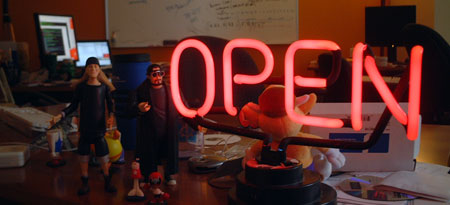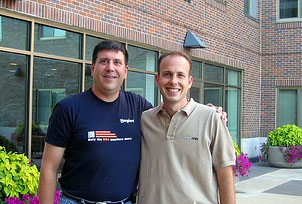I’m sitting here in my hotel room listening to the thunder outside. I’m in San Antonio this week, doing some work for Rackspace. Every time I’m in SAT I try to make it out to Rudy’s, home of the worst BBQ in Texas.

Five of us went at lunch and ordered a pound of brisket, a pound of turkey, a pound of chopped pork, five links and a quart of creamed corn. We ate it all.
Yum.
Coté picked up on my post on support for a blog entry he was working on concerning commercial open source support business models. As usual he raises a number of good points, but as someone who has been running just such a business for over five years I always find the discussion of this here new business model slightly amusing, as our business model is actually quite old.
At the OpenNMS Group we sell services, of which support is one. We also sell consulting, training and custom development. “Software Support” is supposed to mean the same thing as the support you buy for any proprietary software product (but better). In our support Statement of Work we list the three types of issues that are covered by support: configuration, bugs, and enhancements.
A configuration issue is along the lines of “how do I get OpenNMS to do something”. The resolution is that we help the client with their configuration. We do not, however, do it for them (usually). For example, if there is a MIB file with a number of traps in it that the client would like to import into OpenNMS, we will help them use mib2opennms to generate the events, and show them how to modify one or two. If there are 100+ events we will not configure all of them. That would be out of scope.
A bug is “OpenNMS should behave this way, and it don’t”. Luckily these are much more rare, and we respond (after verifying it is indeed a bug) with a workaround and/or a code change.
Finally, there is the “how do I get OpenNMS to do something” where the answer is “it don’t”. In this case we are more than happy to work up a custom development proposal.
That’s how we define “support”. The different levels we offer differ in what’s covered, how many people can open support tickets, response time and hours of coverage.
Everything else on Coté’s list tends to fall under “consulting” or “custom development” in our company. Configuration, scaling, the big questions of “how do I get this application to provide value in my environment” are the real meat of our business.
This is really nothing new. When I used to work as a VAR, the software vendor would tell us that for every dollar in software we sold, we could expect eight dollars in services. Thus the real money for VARs was in “value added” services, not selling software. We just decided to change the model a bit and say, hey, keep your dollar, you can have the software for free. And, oh, since our tool is much more flexible than the stuff you’re used to, we can do the work for four dollars instead of eight.
What is new is the transition of traditional software companies to the services model. We’ve never been a software company, so it doesn’t really impact us. No one assumes a plumber can’t make a living if he doesn’t manufacture pipes and fittings, and no one assume a doctor can’t make a living if he doesn’t create the medicines he prescribes. So it’s amusing when I’m asked how do we make money selling free software. The answer is we don’t. Of course in the eyes of the traditional software company investor that is the wrong answer. There is no way a services company can be successful.
I, of course, don’t believe that. Almost half of IBM’s revenue comes from services, and that amount keeps growing. IBM is turning itself into a services company, but I doubt they will ever consider themselves a “support” company.
While I usually don’t name our clients, I bring up Rackspace because they more than any other company I work with seem to really understand support as a business. As I was wandering around the office today there was a lot of positive energy. Lunch was supplied by the company for the support staff, and it included hot dogs and hamburgers grilled outside along with a large number of other dishes.
“Fanatical Support” is their tagline, and they tend to deliver. I was really confused for the first couple of days of this trip because everywhere you go there are these McCarthy-era signs saying “Report Them!” and “Finger Pointing Encouraged” and I thought they’d had a rash of equipment thefts. I looked a little closer and in much smaller letters it says “Report Fanatical Behavior”. It’s a program to recognize those who go the extra mile.
This is nothing new at Rackspace. There is a wall of photos of outstanding “Rackers” wearing a “Fanatical Support” straight jacket that has been growing in number at least for the five years I’ve been working with them.
But the hard part is getting people to realize that while the software is free, the expertise to use it is not. Our happiest customers are those who buy a lot of services from us.
I really get the recurring joke about the doctor at party who is asked for free medical advice. I travel a lot, and sometimes I’m asked about what I do for a living. When I say “I work with computers” it is rare that it isn’t followed by a question about why their three year old computer is slow, or why do they get so much spam. This has happened, I swear, when I was wearing my “No I will not fix your computer” shirt. I could lie, but on occasion I end up meeting someone in the business who I really do want to talk to. But I do have a sure fire way to respond when meeting the other kind. I reply:
“Sorry, I wasn’t clear. When I say I work with computers I meant I recycle them.”





